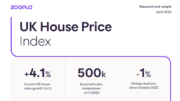By the end of 2021, one in 16 homes will have changed hands, making it the busiest property market since 2007, the property portal Zoopla has predicted.
Strong buyer demand has pushed prices by 6.0 per cent on the year – just short of double the rate of house price inflation in 2020 – putting the average value of a home to £240,000, up from £200,000 five years ago.
But a peak may have been reached, for now at least. ‘While house price growth is running at a near seven year high, 6.9 per cent growth marks a slight easing back from the above 7 per cent growth recorded in August and September. Furthermore, quarterly figures indicate a slowdown in the overall pace of growth – down from 2.8 per cent in July to 1.2 per cent in October’, said Zoopla.
‘At a regional level, Wales continues its eight-month run of registering the highest rate of house price growth, up at 10.8 per cent, followed by the North West of England (9.per cent). London offers a sharp contrast; after being most affected by the pandemic and subsequent lockdowns, it is registering more modest price growth of 2.3 per cent.
‘At a city level, Liverpool, Manchester and Sheffield continue to show the highest rate of growth at 10.6 per cent, 8. per cent, and 7.9 per cent, respectively’.
According Zoopla head of research Grainne Gilmore fewer houses are usually listed for sale in the run up to Christmas, but a sharp increase usually follows in the new year. ‘On average, the supply of listings at the end of January runs some 50 per cent higher than the start of December’, she said.
‘Buyer demand will remain strong moving into next year, but as the market starts to normalise in 2022, there may be an increase in the proportion of activity among movers, who are active in the market as sellers as well as buyers. This should ease the constraint in supply to some extent.
‘Other factors that will affect prices next year include the looming economic headwinds in the shape of rising inflation – which will push household costs higher. Even with some interest-rate rises, mortgage rates are likely to remain relatively low compared to long-run averages, and there is more room for price growth across some of the most affordable housing markets’.








